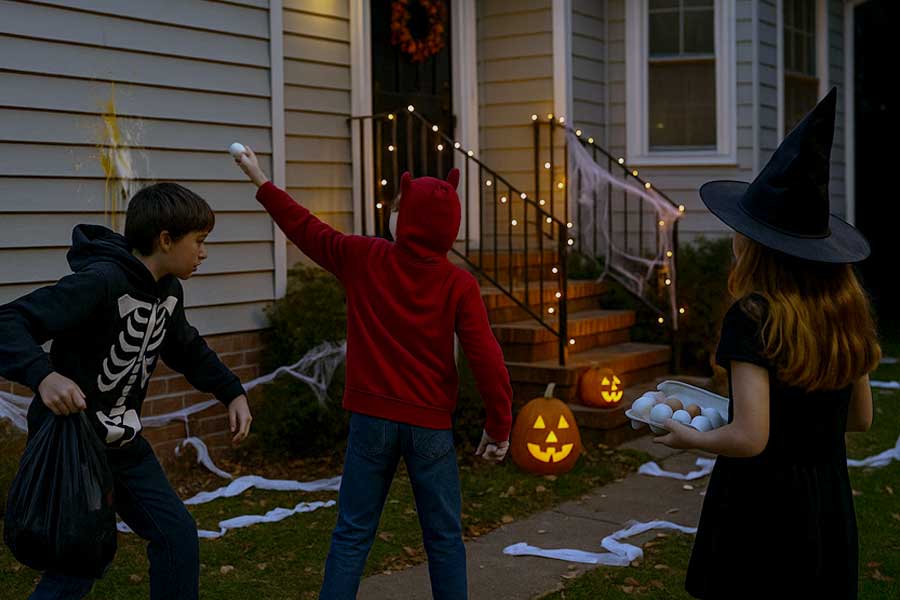Halloween is supposed to be scary fun—not legally terrifying. But for many Colorado families, October 31 ends not with candy and costumes, but with a late-night phone call from the police. Whether it’s vandalism, underage drinking, or a prank gone wrong, Halloween night is one of the busiest for juvenile offenses. If your teen gets arrested, what happens next?
Why Halloween Sees a Spike in Juvenile Arrests
The combination of costumes, peer pressure, and “it’s just a joke” mentality can lead to:
- Vandalism – Acts like toilet-papering houses, smashing pumpkins, or graffiti can result in criminal mischief charges, even if the damage seems minor.
- Trespassing – Entering someone’s property without permission, often for pranks or dares, can lead to legal trouble, especially if property is damaged.
- Underage drinking or possession – Halloween parties often include alcohol, and police take underage drinking seriously—even if it’s a first-time offense.
- Curfew violations – Many Colorado cities have curfews for minors. Being out late without a parent or valid reason can lead to citations or police involvement.
- Disorderly conduct – Loud, disruptive, or aggressive behavior—especially in public—can lead to this catch-all charge, which still carries real consequences.
Many teens don’t realize that even minor misconduct can lead to criminal charges—and the consequences can stretch far beyond Halloween night.
What Happens When a Juvenile Is Arrested in Colorado?
In Colorado, anyone under 18 is processed through the juvenile justice system, not adult court. But that doesn’t mean the process is soft. Police can:
- Detain the teen and notify the parents – Your child may be taken to a detention center or released to a parent, depending on the offense and circumstances.
- Issue a summons (ticket) for court – Even without being taken into custody, a teen can be required to appear before a juvenile judge.
- Refer the case to the District Attorney’s Juvenile Division – Prosecutors will review the case to determine whether to file formal charges.
- File formal charges for misdemeanor or felony offenses – Serious or repeat offenses may lead to full adjudication proceedings.
Depending on the offense, consequences may include:
- Diversion programs – First-time offenders may avoid court by completing counseling, classes, or community service.
- Community service or probation – Courts may impose these conditions in lieu of detention.
- Counseling or educational classes – Especially for substance use or anger management issues.
- Restitution for property damage – Parents may be on the hook financially for what their teen damaged.
- A permanent juvenile record – While some records can be sealed, others may follow your child for years.
Can This Affect Custody or Parenting Rights?
Yes—especially if the parents are divorced or separated. If one parent is accused of being negligent or encouraging the behavior, the other may raise this issue in custody proceedings. Courts consider a child’s legal trouble under the best interest of the child standard in CRS § 14-10-124.
A pattern of arrests, especially when connected to household dynamics, could influence:
- Parenting time allocations – A judge may limit unsupervised time if a parent is seen as failing to supervise the teen adequately.
- Supervision requirements – Courts might require third-party supervision during parenting time.
- Requests to modify custody orders – A parent may seek to change legal custody or decision-making authority based on recurring issues.
Don’t Let a Mistake Turn Into a Record
Juvenile records in Colorado can sometimes be sealed or expunged, but only if the case meets certain criteria. If your child pleads guilty or is adjudicated delinquent, that record may follow them into college applications, job searches, or even future custody disputes.
To protect your child’s future:
- Don’t ignore the charge – Even minor citations can carry unexpected consequences if left unaddressed.
- Don’t assume “kids will be kids” will fly in court – Colorado law treats juvenile offenses seriously, especially repeat or group misconduct.
- Get legal help early – A lawyer can often negotiate diversion, challenge evidence, or help seal a record down the road.
How Boal Law Can Help
At Boal Law, we don’t just defend teens in trouble—we help families minimize the fallout. As a former prosecutor, Brian Boal knows how to negotiate with juvenile DAs, seek alternatives to prosecution, and make sure one Halloween mistake doesn’t define your child’s future.
We also understand how juvenile charges can spill into family law matters. If custody, parenting plans, or protection orders are involved, we can craft a coordinated strategy that protects your child and your parental rights.
Halloween Shouldn’t Haunt Their Record
If your teen got arrested this Halloween—or if you’re worried something might be coming—call Boal Law. We’ll help you handle the legal scares so your family can move forward with confidence (and maybe still eat some candy).

